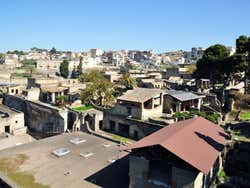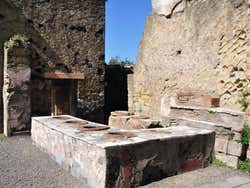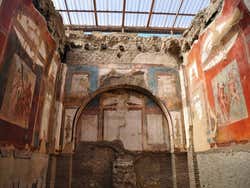
Herculaneum
Located in the region of Campania, the town of Herculaneum suffered the same fate as Pompeii. The town was buried under Mount Vesuvius’s volcanic ashes and mud in 79 AD.
Hit before Pompeii, many inhabitants didn’t have time to escape and were engulfed in layers of debris, ashes and mud, dying instantly to be preserved for centuries.
What to see
At the foot of Mount Vesuvius, the city was the volcano’s first victim, and therefore the first wall of lava, ashes, debris and gases covered Herculaneum completely a little after midnight on 25 August. The previous day, it had been plunged in a cloud of debris leaving it without sunlight.
A UNESCO world heritage site, Herculaneum is better preserved than Pompeii. The city’s houses, baths, taverns, temples and figures are undamaged; therefore, visitors will get a real sense of the splendour of this Roman city.
Wealthier than its neighbouring Pompeii, the town is full of beautiful buildings. The different floors of most of the buildings are still intact and it is possible to see the magnificent frescoes and mosaics covering the walls of palaces, public buildings and mansions.
On the far side of the city are the most luxurious villas overlooking the sea, notably the Villa dei Papiri, which was the luxurious retreat of Julius Caesar’s father-in-law.
In Herculaneum, archaeologists have also found the first Roman preserved skeletons from the first century, since prior to this period Romans would cremate the dead. The skeletons are on display in one of the city’s houses.
Beautifully conserved
The town of Herculaneum has been magically conserved all these years. Objects like beds, and doors managed to remain under the layers of ash and mud without decaying.
Although it isn’t as well-known or as large as Pompeii, Herculaneum’s ruins are extremely impressive and gripping. Definitely worth visiting!
Today, the town of Ercolano lies extremely close to the ruins of Herculaneum, creating an interesting contrast.
Getting to Herculaneum
The most common ways of getting to Herculaneum from Rome are:
- Train: Visitors need to take a train to Naples to get to Herculaneum. These leave from Termini railway station. Once in Naples, the Circumvesuviana line goes to Herculaneum (Ercolano Scavi station). It takes between 2 – 3 hours to get there and the prices range from € 30 (US$ 35.91) to € 100 (US$ 119.73) for a roundtrip, depending on the train.
- Car rental: Although this is the cheapest option for families or groups of friends, you must keep in mind the price of petrol, parking and tolls. We would recommend this option only for those thinking of renting a car for additional days to visit other attractions nearby.



Schedule
From October 15 to March 15: Daily from 8:30 a.m. to 5:00 p.m.
From March 16 to October 14: Daily from 8:30 a.m. to 7:30 p.m.
Price
Adults: € 18 (US$ 21.55)
EU Citizens between 18 and 25 years old: € 5 (US$ 5.98)
EU Citizens under 18 years old and seniors over 65 years old: free admission
Nearby places
Pompeii (14.4 km)
